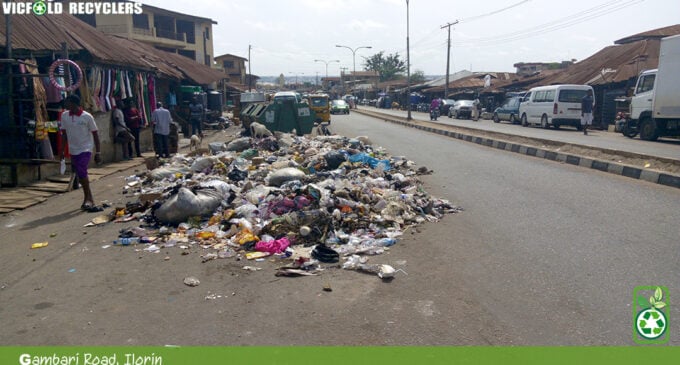Cholera in Kwara: An environmentalist’s perspective

BY AMUSA VICTOR
It is a common scene in Kwara to see residents hurriedly dump refuse in drainages during heavy rainfall, sewage is also seen to flow out of broken chambers in densely populated areas across the state. Quite a number of houses are still without toilet facilities in the metropolis, as such open defecation remains the available option.
An epidemic is the spontaneous spread of infectious disease to a large number of people in a given population within a short period of time, usually two weeks or less. It is a widespread occurrence of an infectious disease in a community at a particular time.
Cholera is a water-borne disease that emerges from a bacterium called vibrio cholerae. Once someone contracts the disease, s/he can experience symptoms ranging from extreme dehydration to diarrhea, to vomiting.
Poor sewage treatment and lack of treatment of drinking water, a trademark challenge in most Nigerian states greatly facilitates the spread of cholera.
In August 2010: Cholera in Nigeria reached epidemic proportions after widespread confirmation of the disease outbreaks in 12 of its 36 states. 6400 cases were reported with 352 reported deaths. The health ministry blamed the outbreak on heavy seasonal rainfall and poor sanitation.
Cholera is not alien to Kwara state, late 2001 there was a similar outbreak, the cholera epidemic claimed at least 40 lives in five days, and another 22-people laid critically ill in hospital. In Moro Local Government Area of Kwara state, seven pupils of primary and post-primary schools were among the victims. All primary and secondary schools in the area were quickly closed indefinitely to avoid further spread of the disease.
Cholera is an acute intestinal infection that causes severe vomiting and diarrhea, leading to serious dehydration and can be fatal if not properly treated. However, if an infected person is given the proper fluids as soon as the first symptoms appear, the disease can be completely cured. A mixture of sugar and certain essential salts must be mixed with clean water and be taken in large quantities to replace the body fluid that is lost. If the patient is rehydrated as soon as possible, the death rate is less than one percent.
It is indeed worrisome that despite the simplicity of the cure, hundreds and sometimes thousands of people in Nigeria die every year from this disease. Access to clean water is a basic human necessity that is denied to 61 percent of Nigeria’s population.
From records, available on WHO website on cholera outbreak late in 2001, Bode Saadu, the district headquarters of Moro Local Government Area of Kwara state was worst hit with 124 reported cases and 16 deaths. According to Reuters report, at least 40 deaths were recorded in less than one week, when news of the outbreak of the water-borne disease was first broken on the floor of the Kwara state Assembly on Wednesday, October 24th, 2001, lawmakers were prompted to suspend the day’s session abruptly. It was widely reported that much more afflicted people were in critical condition in the worst-hit towns and villages of Jebba, Warafa, Eleja-Sulu, Ile-Pupa, Ekejo, Lasaki and Ejidongari.
Again in 2011, another cholera outbreak struck Ilorin the state capital. The then commissioner for health, Mallam Abdul Kayode Issa, said the situation was under control.
He said that the rapid response team of the ministry had swung into action since when the case was first reported at the University of Ilorin Teaching Hospital.
He said the state government had made drugs available at the various primary health care centres in Ilorin East and West local governments and added that the ministry had put measures in place to prevent its spread precisely from Adabata and Okelele. a densely populated area of the state capital – Ilorin.
Just a few days back, June 2017, another outbreak in Ilorin was reported in the media with deaths numbering 12 in less than 5 days. Again, the government through the secretary to the state government, Alhaji Isiaka Gold, during an assessment visit to primary health care centers, cottage hospitals, and the General Hospital, Ilorin was out to say the government had deployed resources to ensure that cholera does not spread in the state. But this time around the people are not taking the blame alone, some people have blamed the outbreak on the heaps of refuse dumps in and around the city waiting to be evacuated by the authorities concerned. These points back to the matter of poor sanitation, lack of access to clean drinking water and the failures of residents to take cognizance of Food Hygiene.
It is worthy of note that street sweepers and scavengers pick waste plastic bottles from waste dumps and sell to merchants at popular markets across the metropolis, who in return sell same to makers of local beverages like Kunu and Zobo drink. Unfortunately, the public who have no idea of the source of plastic bottles used in packaging these beverages get exposed to high risk of contracting Cholera and other food hygiene related diseases.
Sanitation is the means of promoting hygiene through the prevention of human contact with dangers of waste especially sewage, by proper treatment and disposal of the waste, often mixed into wastewater. The resultant dangers may be physical, microbiological or biological agents of disease. The well-being of a community cannot be separated from its attitude towards its environment. Indiscriminate disposal of waste, dumping of waste in drainages, unwholesome eating practices, and poor basic personal hygiene are the contributions of the residents to the cholera outbreak in Kwara state, Ilorin in particular.
The belief that government has to do everything for it citizens needs to be quickly eradicated, the environment is our common wealth, everyone is a stakeholder. We are all saddled with responsibilities of protecting our environment, our commitment to these responsibilities is not for the benefit of aliens but for our own common good.
It is of also of note that the waste disposal infrastructure set in place by the government is grossly overstressed as the population of residents in the state is growing at alarming proportions due to the relative peace experienced over the years. The gap between the amount of waste generated in the metropolis and the amount effectively collected by the social waste operators and the commercial waste collectors is very wide as evident in the indiscriminate disposal of waste on curb sides and internal road network of Ilorin metropolis. As a popular saying has it that prevention is better than cure, the government and its people need to put a stop to their blame games, everyone has a role to play. As a city develops it is expected that the municipal authorities need to put in place salient measures to handle the proper management of waste generated by residents. Some people have called for the establishment of a Waste Management Authority as is obtainable in other states.Others have argued that it is not about the proliferation of agencies of government but the resolve of the State Ministry of Environment to perform its statutory roles and put enforcement of environmental laws on the front burner. There must be policy reviews and ratification of sanctions commensurate with the effects of disobedience to environmental laws.
According to a Joint News Release by WHO/UNICEF in March 2008, sixty-two per cent of Africans do not have access to an improved sanitation facility — a proper toilet — which separates human waste from human contact, according to the WHO/UNICEF Joint Monitoring Programme for water supply and sanitation. In fact, about 2.6 billion people around the world live without access to a toilet at home and thus are vulnerable to a range of health risks one of which is Cholera. Former World Health Organisation Director-General Margaret Chan once argued that Improved sanitation contributes enormously to human health and well-being. She further ascertained that simple, achievable interventions can reduce the risk of contracting diarrhea disease by a third. Sanitation is considered as a cornerstone of public health. Poor sanitation, particularly in the context of urbanisation, allows for sewage or waste to flow directly into streams, rivers, lakes, and wetlands, affecting marine ecosystems, fouling the environment and exposing millions of children and adults alike to communicable diseases. There cannot be any sustainable victory against epidemics like cholera without the active involvement of the ministry of environment alongside eagle-eyed response team from the ministry of health. For diseases such as cholera and other sanitation influenced diseases like Lassa fever, prevention is truly cost effective than management and cure.
The number of social waste collectors engaged in waste disposal in Kwara state is too little to achieve much. Many thanks to the commercial waste collectors, the outbreak of other sanitation related diseases would have been of disastrous proportions. In other climes, the government supports private participation in environment-related matters as no effort is too minute, there must be a review of the policies surrounding registration of new entrants into the waste disposal sector of the ministry of environment. The fees charged to register new players in the sector must be affordable enough to attract involvement of private entities, the regulatory stand of the ministry of environment as regards the operation of both social and commercial waste collection operators across the state must be given a boost, erring operators must be sanctioned as a deterrent for laxity. The commercial waste operators should be supported by logistic and equipment loans payable at single unit interest rate, unscrupulous levies collected from waste disposal operators should be discouraged, as the government will only be doing itself and indeed its citizens quite a lot of favour by encouraging more private participation in waste collection and disposal across the state. Advocacy campaigns shouldn’t be left till an outbreak occurs, it should be part of the responsibilities of the ministry of environment and the ministry of health to organise joint advocacy campaigns on public health issues and its preventions, adequate funding must be budgeted for public health interventions as epidemics come unannounced. The environment health officers squad of the ministry of environment must be reinfused with the drive to enforce environmental laws, house owners must provide decent toilet facilities, all private and public institutions of education must have decent toilet facilities.The Kwara State Environmental Protection Agency must ensure relevant industries in the state have and maintain effluent treatment plants and not discharge their waste water into streams and rivers. Sanitation must take a whole new dimension in Kwara state to forestall the reoccurrence of an outbreak of cholera and other related epidemics. In matters of the environment, everyone has a role to play, government and residents alike.
Amusa Temitope Victor is an environmentalist, social entrepreneur and zero-waste advocate. He is the chief executive officer, Vicfold Recyclers- A recycling firm based in Ilorin Kwara state Nigeria, which promotes incentive motivated recycling. (www.vicfoldrecyclers.com). He can be reached on +23408107454031 or [email protected]
Views expressed by contributors are strictly personal and not of TheCable.











There are no comments at the moment, do you want to add one?
Write a comment